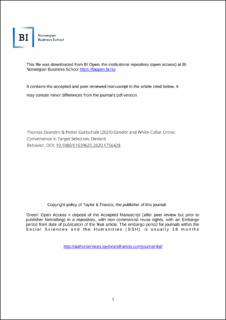Gender and White-Collar Crime: Convenience in Target Selection
| dc.contributor.author | Dearden, Thomas | |
| dc.contributor.author | Gottschalk, Petter | |
| dc.date.accessioned | 2021-07-12T08:41:41Z | |
| dc.date.available | 2021-07-12T08:41:41Z | |
| dc.date.created | 2020-05-06T06:46:46Z | |
| dc.date.issued | 2020 | |
| dc.identifier.citation | Deviant Behavior. 2020, 1-9. | en_US |
| dc.identifier.issn | 0163-9625 | |
| dc.identifier.uri | https://hdl.handle.net/11250/2764129 | |
| dc.description.abstract | We find support for the idea that gender affects target selection when committing white-collar crime. Based on the theory of convenience, we argue that male and female offenders vary in their perceptions of convenience when considering alternative categories of crime and alternative categories of victims. We obtained data from Utah’s White Collar Crime Offender Registry. Individuals in the state of Utah who are convicted of a second-degree white-collar crime felony or higher are required to register. The categories of crime included from statute HB 378 are securities fraud, theft by deception, unlawful dealing of property by fiduciary, fraudulent insurance, mortgage fraud, communications fraud, and money laundering. | en_US |
| dc.language.iso | eng | en_US |
| dc.publisher | Taylor and Francis | en_US |
| dc.title | Gender and White-Collar Crime: Convenience in Target Selection | en_US |
| dc.type | Journal article | en_US |
| dc.type | Peer reviewed | en_US |
| dc.description.version | acceptedVersion | en_US |
| dc.source.pagenumber | 1-9 | en_US |
| dc.source.journal | Deviant Behavior | en_US |
| dc.identifier.doi | 10.1080/01639625.2020.1756428 | |
| dc.identifier.cristin | 1809593 | |
| cristin.ispublished | true | |
| cristin.fulltext | postprint | |
| cristin.qualitycode | 1 |
Tilhørende fil(er)
Denne innførselen finnes i følgende samling(er)
-
Scientific articles [2181]
